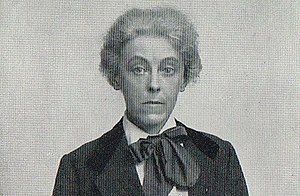Analysis of Song
Charlotte Mary Mew 1869 (Bloomsbury, London) – 1928 (London)
Love love to-day, my dear
Love is not always here
Wise maids know how soon grows sere
The greenest leaf of Spring.
But no man knoweth
Whither it goeth
When the wind bloweth
So frail a thing.
Love love, my dear, to-day
If the ship's in the bay
If the bird has come your way
That sings on summer trees.
When his song faileth
And the ship saileth
No voice availeth
To call back these.
| Scheme | AXABCCCB DDDECCCE |
|---|---|
| Poetic Form | |
| Metre | 111111 11111 1111111 010111 1111 1011 1011 1101 111111 101001 1011111 111101 1111 0011 111 1111 |
| Closest metre | Iambic trimeter |
| Characters | 389 |
| Words | 77 |
| Sentences | 5 |
| Stanzas | 2 |
| Stanza Lengths | 8, 8 |
| Lines Amount | 16 |
| Letters per line (avg) | 19 |
| Words per line (avg) | 5 |
| Letters per stanza (avg) | 149 |
| Words per stanza (avg) | 38 |
Font size:
Submitted on May 13, 2011
Modified on March 05, 2023
- 23 sec read
- 77 Views
Citation
Use the citation below to add this poem analysis to your bibliography:
Style:MLAChicagoAPA
"Song" Poetry.com. STANDS4 LLC, 2024. Web. 28 Apr. 2024. <https://www.poetry.com/poem-analysis/5553/song>.


Discuss this Charlotte Mary Mew poem analysis with the community:
Report Comment
We're doing our best to make sure our content is useful, accurate and safe.
If by any chance you spot an inappropriate comment while navigating through our website please use this form to let us know, and we'll take care of it shortly.
Attachment
You need to be logged in to favorite.
Log In